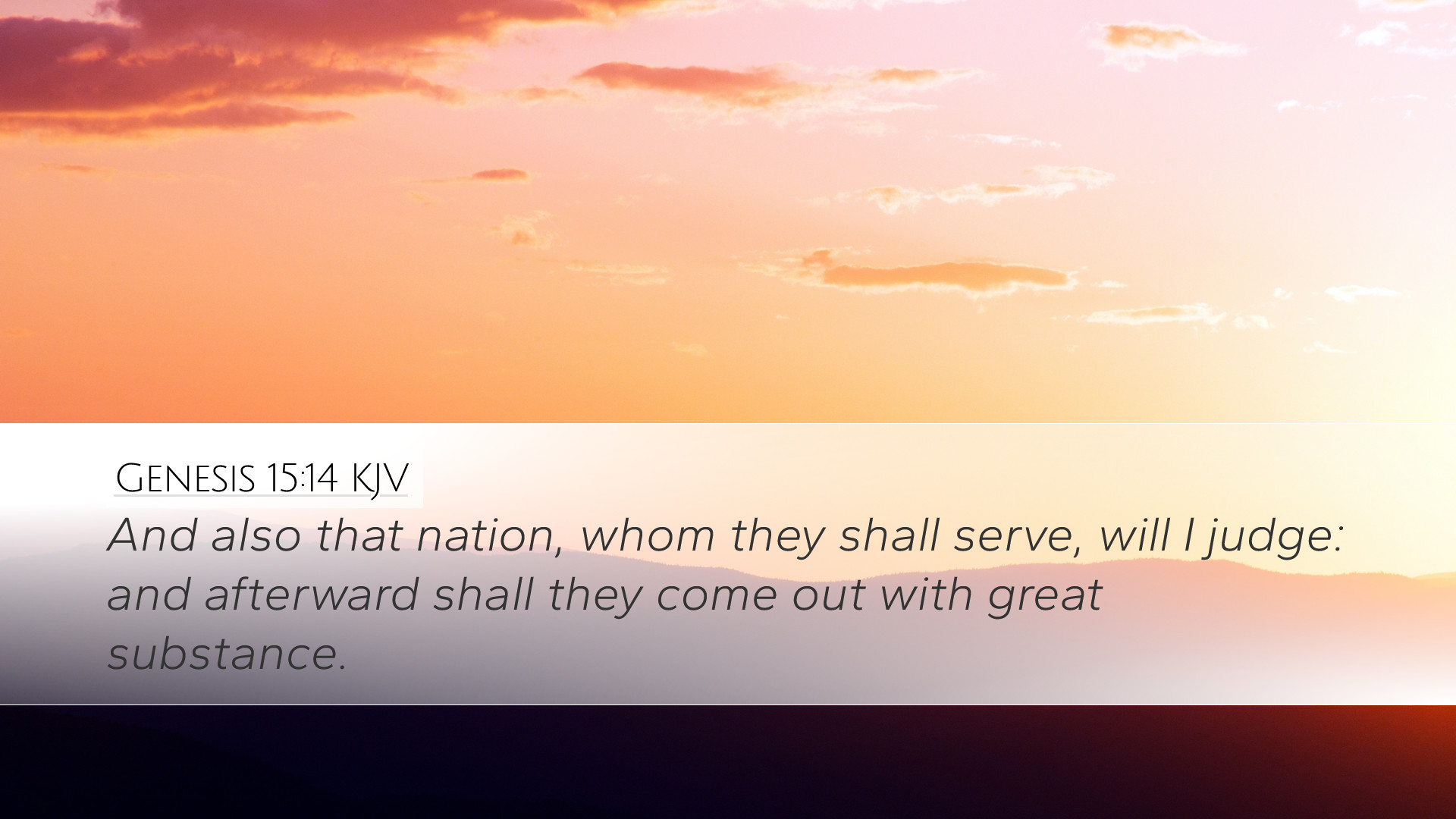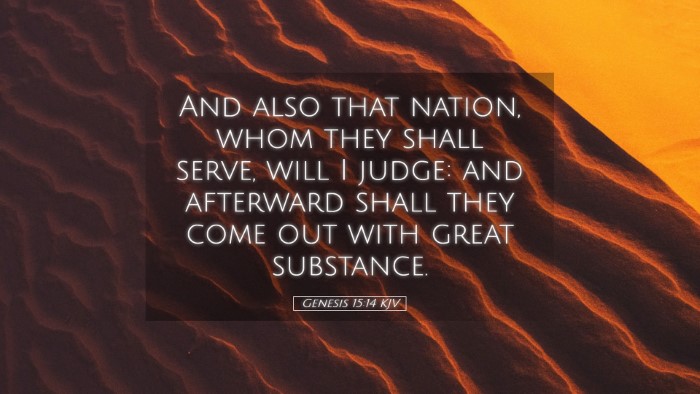Commentary on Genesis 15:14
Verse Context: Genesis 15:14 states, "But I will also judge that nation, whom they shall serve; and afterward shall they come out with great substance." This verse is a pivotal moment in the Abrahamic covenant, illustrating God's promise to Abraham regarding his descendants and their future oppressors.
General Overview
This verse draws attention to the fate of Abraham's descendants during their time in Egypt. God reassures Abraham regarding the future of his lineage, highlighting both the suffering they will endure and the ultimate victory they will attain, bringing forth a narrative of hope amidst oppression.
Insights from Commentaries
Matthew Henry's Commentary
Matthew Henry presents a profound perspective on Genesis 15:14 by emphasizing the certainty of God's justice. He argues that God's judgment upon Egypt, as indicated by the phrase "I will also judge that nation," serves as assurance that no oppression of God's people goes unpunished. Henry elucidates that this serves as a reminder to believers that while they may undergo trials and tribulations, God is vigilant over their plight and will enact justice in His timing.
Henry further posits that the phrase "afterward shall they come out with great substance" signifies God's provision for His people. It reflects the merciful character of God, ensuring that after affliction, His people will not only be freed but abundantly blessed. This sends a powerful message about God’s redemptive work throughout history.
Albert Barnes' Notes on the Bible
Albert Barnes adds an insightful layer by interpreting the "nation" mentioned in the verse as a reference to Egypt. He highlights that the oppression faced by the children of Israel should not be seen as a final failure but as a necessary path to a future glory. Barnes notes that God's promise transcends the temporal sufferings, reinforcing that divine prophecies encompass both hardships and eventual triumphs.
He emphasizes the term “great substance,” suggesting that the Israelites will leave Egypt not only free but enriched. This detail paints a picture of God’s providence and generosity, serving as an encouragement for those in despair. Barnes’ insights underscore that God's purposes—even when shrouded in hardship—are ultimately directed toward blessing and fulfillment.
Adam Clarke's Commentary
Adam Clarke, in his remarks on Genesis 15:14, elaborates on the theological implications of God's promise. Clarke interprets this verse as an indicator of God’s overarching plan for redemption. For him, the text signals that the bondage in Egypt serves a deeper purpose within God’s redemptive framework. Clarke discusses the need for spiritual education through suffering, suggesting that trials can refine and prepare God’s people for greater works.
Moreover, he notes that the “great substance” might symbolize both material wealth and deeper spiritual blessings. Clarke connects this promise to the broader biblical narrative, seeing it as a foreshadowing of the blessings that would later come through Christ, the ultimate deliverer. He invites readers to ponder the ways in which God transforms hardship into hope.
Thematic Implications
Judgment and Deliverance
Genesis 15:14 encompasses two significant themes: divine judgment and deliverance. The promise of judgment against Egypt presents a significant theological point—God’s sovereignty over nations, particularly in how they relate to His chosen people. This serves to remind believers that God is the ultimate judge.
Hope Amidst Suffering
Additionally, the theme of hope within suffering is pervasive. This verse assures us that even in the bleakest situations, there is light ahead. Pastors and spiritual leaders can leverage this truth in counseling those facing hardships, reassuring them of God’s faithfulness and the promise of redemption.
Practical Applications
- Encouragement in Trials: This passage serves as a source of comfort for individuals struggling with current trials, affirming that God has a plan that may include hardship but leads to eventual blessing.
- Understanding God's Justice: Embrace the assurance that God observes injustice and will ultimately right every wrong, motivating believers to remain steadfast in faith and righteousness.
- Teaching on God's Providence: Use the promises in this verse to remind congregations of God's ability to provide beyond expectations, cultivating a spirit of gratitude and reliance on His providence.
Conclusion
Genesis 15:14 stands as a powerful testament to God's faithfulness and sovereignty. Its implications transcend time, offering vital lessons for believers today. As pastors, theologians, and students engage with this text, the collective wisdom from Henry, Barnes, and Clarke enriches our understanding of God's justice and providence. In summary, this verse invites us into a deeper faith, encouraging us to trust in God's promises through every circumstance.


